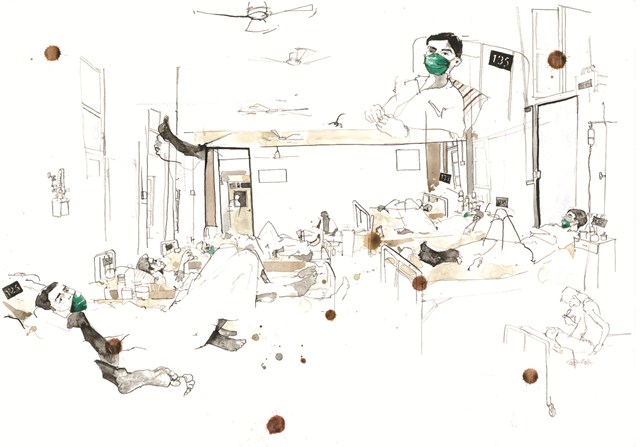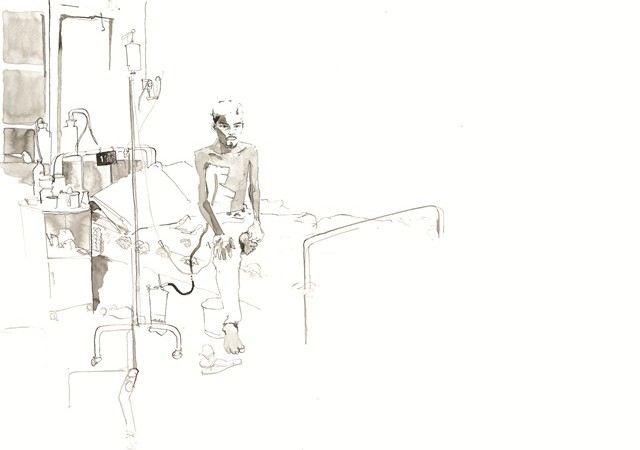There were 1.1 million people globally who needed simultaneous treatment for tuberculosis (TB) and HIV in 2013. Out of those 1.1 million, 360,000 died, and the problem remains one of the major global health challenges in the present time. HIV can destroy so many of your CD4 cells that your body can't fight infections and diseases anymore.
HIV patients usually are not infected with TB bacteria unless in contact with someone who also is infected with TB bacteria. But if they live in a country with a high prevalence of TB, there is a high chance of being infected with it.
TB-HIV is indeed a critical public health issue in India, as Shobha Shukla at Citizen News Service writes:
According to WHO estimates, India has the highest burden of TB in the world with 2.3 million cases (out of a global incidence of 8.7 million) and about 320,000 deaths occurring annually. 5% or 0.11 million of the TB patients in India are HIV positive too. India thus accounts for about 10% of the global burden of HIV-associated TB with 100,000 patients co-infected with the two diseases annually. Without timely diagnosis and treatment, a large number of these doubly sick people are likely to die.
Estimated deaths due to HIV/TB are 42,000 in India, according to the World Health Organisation (WHO). The high rates of HIV are leading other diseases like TB to be a risk factor. HIV/TB is a major issue in India due to the lack of space, fresh air, toilets, sunlight and education.
Anti-retroviral therapy along with anti-tuberculosis treatment is the only available treatment in present time. There is currently no cure HIV infection, although anti-retroviral treatment can suppress the HIV virus.
Doctors Without Borders/Médecins Sans Frontières (MSF) is one organization that is delivering healthcare to people with HIV/AIDS and TB in India, especially to marginalised groups like transgender communities.
In the above video from MSF India, Iqbal, a drug-resistant tuberculosis survivor from Mumbai, Maharashtra, explains how he defeated the disease. “You just have to be patient, don’t give up,” he says. After struggling with tuberculosis for two years he says he finally feels that he is better. Iqbal advises that “things can get better, DR-TB can be cured, you can live a normal life like everyone else.”
According to the World Health Organization:
TB is the most common presenting illness among people living with HIV, including among those taking antiretroviral treatment and it is the major cause of HIV-related death.
Illustrator George Butler, who collaborated with MSF in 2013 to sketch patients suffering drug-resistant tuberculosis, writes on his website:
Until now tuberculosis has been continually overlooked but is a worsening problem, especially in the major capitals of the world and particularly London.
There is a strong stigma attached to both HIV and tuberculosis, and many patients lose their jobs because of it. Beyond medical treatment, counseling is another way to help patients.
A patient with MDR-#TB & #HIV waits for his regular check-up in #MSF clinic #India http://t.co/4xHpDw9SgE pic.twitter.com/0ua6Vc53Ch
— MSF Ireland (@MSF_ireland) May 16, 2014
According to the WHO, the Indian government has made a large effort to reduce the rates of HIV/AIDS and TB, with the country spending 252 million US dollars in 2014 on its TB program, of which 66 per cent was funded domestically and 34 per cent was funded internationally.
But for Shakti Garg from India, authorities aren't focusing on these diseases enough:
India has been able to eradicate polio with its mission modedness. Why cant such urgency be brought to anti-TB/HIV program? #tickingTimeBomb
— Trouble-phile Indian (@shakti_garg) October 26, 2014








